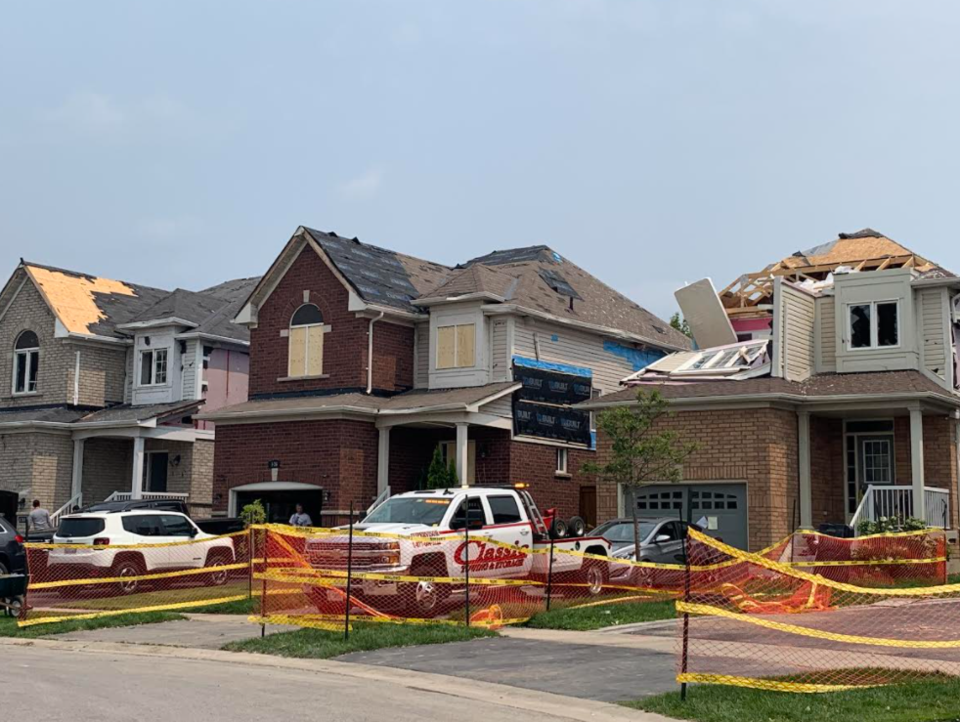City council got blowback Monday night for not yet offering rebates to Barrie homeowners for making their homes wind-resistant after the July 15, 2021 tornado.
“I’m disappointed that Barrie didn’t take bolder action yet. … Most damaged homes are going to be rebuilt without enhanced tornado protection,” said Paul Kovacs of the Institute for Catastrophic Loss Reduction at Western University, who made a presentation to council.
“Barrie can’t require tornado protection, but could choose to offer financial incentives for homes that are rebuilt and new homes that include tornado protection before change is made in the (Ontario) Building Code (OBC),” said Kovacs, an expert on severe weather resilience.
Last summer’s tornado touched down in southeast Barrie, with maximum wind speeds reaching 210 kilometres per hour — damaging hundreds of homes and some small businesses in the Mapleview Drive East/Prince William Way area. It compromised the structural integrity of buildings; some of them lost their roofs.
Last August, city council approved a motion that proposes the province change the OBC to require the use of straps, clips or other mechanisms to better connect the roof, wall and the foundation of homes. Hurricane strapping or clips connect and strengthen wood-framed roofs and houses, with the most common ones made of galvanized steel or stainless steel. They are designed to help protect structures from severe weather.
Council’s motion also asked that in order to encourage installation of approved severe wind resilience features, city staff investigate the feasibility of introducing a rebate program for homeowners that did not experience damage resulting from tornado damage on July 15, 2021 and financial incentives for those whose homes that were damaged, and report back to councillors.
The rebate/financial incentives program never materialized, however.
“I’m disappointed that Barrie did not yet act,” Kovacs said.
But Kovacs got some blowback himself from Coun. Robert Thomson, who asked if the Institute for Catastrophic Loss Reduction was lobbying for rebates from the insurance industry, which gives them for snow tires on automobiles and burglar alarms in homes.
“Do you think that more of your energy should be based on lobbying the insurance companies?” Thomson asked Kovacs. “I thought your presentation would be more about the benefits and the science behind the (hurricane) straps than bringing up something about a motion of council.
“I found that kind of odd, but I’m curious about the angle you’re taking,” Thomson added. “There’s been a lot of construction going on in the tornado area and you’ve said that some of these homes aren’t even building with the straps. I find that bizarre. Are you lobbying the insurance companies to offer a rebate on a new home build?”
“We’re academics, so we don’t lobby,” answered Kovas, noting the institute does share its expertise and science with the insurance industry. “Insurance companies have to decide what to do with that knowledge.”
More stringent building requirements cannot be legally enforced until modifications are made to the Ontario Building Code to mandate different construction techniques.
Barrie city council does not have the authority to change the OBC, which defines minimum construction standards for this province.
The OBC was created and must be amended by the province, but council can ask for charges.
“Why does it seem to be so difficult to get this change in the building code made?” asked Coun. Clare Riepma. “What’s the problem behind it?”
“We have been pushing this for decades and it is an extremely hard field to move and get action on,” Kovacs said. “The benefits greatly exceed the modest few hundred dollars cost (for hurricane straps). For builders that are watching and trying to pull every cost out if it, increasing the cost by a few hundred dollars means a higher cost.
“We know how to build tornado-protected homes, we can reduce the damage from an extraordinary, big tornado and we can eliminate the damage from tornadoes like happened (in Barrie) last year, largely eliminate it, but it will cost a few hundred dollars.”
“The goal is to, of course, change the Ontario Building Code and to also address the national harmonization of the building codes… across Canada,” said Coun. Natalie Harris. “It will take some time.”
She said there are some home builders in Ward 6, which she represents, who have come forward to say they are putting hurricane straps in their new houses.
Kovacs said the insurance industry will pay $90 million to 1,500 Barrie homeowners that experienced damage and $10 million to 125 businesses as a result of the July 15, 2021 tornado.
The Insurance Bureau of Canada confirmed Tuesday that $100 million is the most recent number for damage caused by this tornado.
But Kovacs said beyond that number, there has also been extensive damage to vehicles, indirect damage and intangible losses — expenses incurred while homes are being repaired, and loss of business. Intangible losses include stress and a loss of personal security.
“There’s no measures of indirect and intangible losses, but it’s likely the tornado resulted in $100 million of insurance damage to homes and businesses, plus indirect and intangible losses that might exceed $150 million,” he said.
“This is a $250-million tornado last year.”



